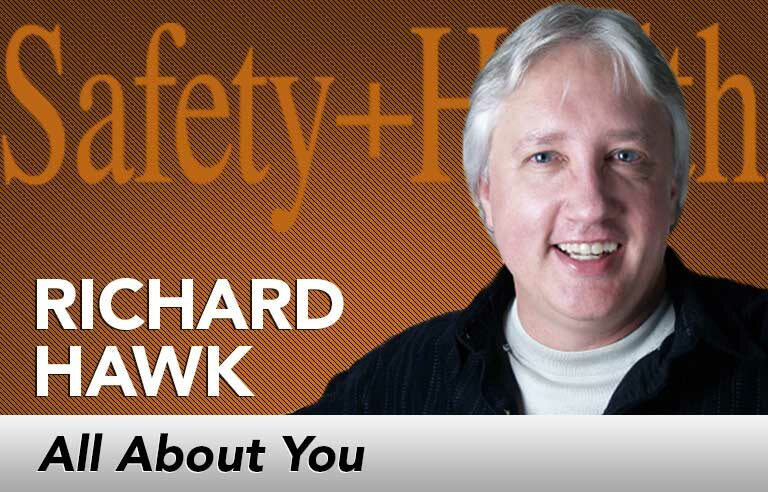All About You: Don’t let indecision paralyze you

EDITOR’S NOTE: Motivating employees to work safely is part of the safety professional’s job. But who motivates the motivator? In this monthly column, veteran safety pro and professional speaker Richard Hawk offers his entertaining brand of wisdom to inspire safety pros to perform at their best.
When you don’t know what to do, you tend to do nothing. I know that’s true for me. As Pulitzer Prize-winning poet and author Sylvia Plath wrote, “Indecision and reveries are the anesthetics of constructive action.”
When I’m unsure of what step to take next, I tend not to take one. Such indecision can be dangerous. Think of how important it is that employees are sure of the right action to take when they come across an unexpected hazard.
Indecisiveness is paralyzing because it doesn’t give us direction. We end up either doing nothing productive or falling for the first emotional push that sends us to do who knows what.
Decisiveness, on the other hand, is a panacea for irresolution. But what does it take to be decisive? Is there something practical that will help?
Yes, there is.
It’s important to know what you want and the outcome you’re trying to create, because having a broad picture of your goal aligns you in a purposeful direction. But you also need to know what to do when day-to-day changes or emotional roadblocks divert you from your plans. One technique that has helped me to be more decisive is the if-then – or conditional – statement process.
First, use active – not restrictive – if-then statements. For example, avoid this kind of phrasing: “If I get angry at a family member, then I won’t raise my voice.” This response isn’t near as likely to change your feelings and behavior as: “If I get angry at a family member, then I will go to another room and take a few deep breaths.”
Writing out a list of your if-then statements will help them stick in your mind better than if you only think about them. However, I’ve found that, either way, they help. Here are three of my conditional action statements:
- If I don’t feel like going to the fitness center, then I will do 15 push-ups and 20 sit-ups in my living room.
- If I’m feeling down, then I will take a walk or play my guitar.
- If I have writer’s block when trying to start my Safety+Health column, then I will just list the main points of the topic.
Here are some more if-then statements that may help you take constructive action instead of feeling unsure of what to do:
- If I start to get a headache during a long meeting, then I will drink a bottle of cold water and spend a couple of minutes stretching when I get back to my office.
- If [enter name of a co-worker who bugs you here] starts to get me upset, then I will excuse myself and go to the restroom.
- If I feel exhausted or angry when I get home from work, then I will sit in the driveway for a few moments, pay attention to my emotions, and think about some of my blessings or other positive thoughts.
- If I can’t fall asleep because I’m upset or worried about something that happened at work, then I’ll get up and write down possible solutions. (My “then” for this situation also includes drinking a warm cup of soothing herbal tea.)
You’ll never have an if-then statement for everything that happens to you, but it’s easy to come up with a new action when a surprise arises. At one of my talks last year, someone started to introduce me while I still was in the back of the room greeting people. It took me by surprise and made for a slightly uncomfortable beginning because I had to rush to the front of the auditorium.
Now, “If the person is new to introducing speakers (he was), then I make sure I explain to the person that I will notify him or her when to start my introduction.” (Since that timing mishap, I always ask everyone introducing me to wait for my signal before starting.)
Whether it’s for emotional recovery or a technical glitch, knowing what you’ll do when a negative situation arises by having prepared an if-then response will go a long way toward giving you direction and helping you to be more decisive.
This article represents the views of the author and should not be construed as a National Safety Council endorsement.
Richard Hawk helps safety professionals become better leaders through his keynotes, workshops, articles and books so they can create vibrant safety cultures. His popular “Dangerous Daze” keynote teaches employees how to focus better and improve their situational awareness, a key skill to preventing incidents. To contact Richard, visit makesafetyfun.com.
Direct to your inbox: Sign up to be notified in email about new "All About You" columns.
Listen on Soundcloud or Stitcher
Post a comment to this article
Safety+Health welcomes comments that promote respectful dialogue. Please stay on topic. Comments that contain personal attacks, profanity or abusive language – or those aggressively promoting products or services – will be removed. We reserve the right to determine which comments violate our comment policy. (Anonymous comments are welcome; merely skip the “name” field in the comment box. An email address is required but will not be included with your comment.)

